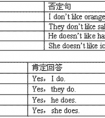改错。找出划线部分错误的一项,并且在题后横线上改正。1. Could you tell me some informations about the tour to Taiyuan A BC D2. I'd like to buy two air tickets -八年级英语
He seldom comes to see us. 他很少来看我们。
We usually go shopping once a week. 我们通常一周买一次东西。
The new students don't always go to dance. 新学生并不时常去跳舞。
4、疑问副词,连接副词,关系副词以及修饰整个句子的副词,通常放在句子或从句的前面。
When do you study everyday? 你每天什么时间学习?
Can you tell me how you did it? 你能告诉我你如何做的吗?
First, let me ask you some questions. 先让我来问几个问题。
How much does this bike cost? 这辆车子多少钱?
Either you go or he comes. 不是你去就是他来。
The students were reading when the teacher came into the classroom. 当老师进教室时,学生们正在读书。
5、时间副词和地点副词在一个句中, 地点副词在前面时间副词在后面。
We went shopping in the supermarket at 9 o'clock yesterday.
昨天九点钟我们到超市买东西了.
What were you doing in the classroom yesterday afternoon?
昨天下午你在教室里干什么?
The accident took place in the Eleven Avenue one hour ago.
一小时前十一号大街发生了一场事故。
6、否定副词在句首,句子要倒装,如:
Never have I felt so excited!
1) close与closely
close意思是"近"; closely 意思是"仔细地"
He is sitting close to me.
Watch him closely.
2) late 与lately
late意思是"晚"; lately 意思是"最近"
You have come too late.
What have you been doing lately?
3) deep与deeply
deep意思是"深",表示空间深度;deeply时常表示感情上的深度,"深深地"
He pushed the stick deep into the mud.
Even father was deeply moved by the film.
4) high与highly
high表示空间高度;highly表示程度,相当于much
The plane was flying high.
I think highly of your opinion.
5) wide与widely
wide表示空间宽度;widely意思是"广泛地","在许多地方"
He opened the door wide.
English is widely used in the world.
6) free与freely
free的意思是"免费";freely 的意思是"无限制地"
You can eat free in my restaurant whenever you like.
You may speak freely; say what you like.
副词有加a或ly的 区别在于通常加a 的副词描述一种状态,而加ly 的副词则倾向于感觉。
考点名称:介词
- 介词:
是一种用来表示词与词、词与句之间的关系的虚词,在句中不能单独作句子成分。
介词后面一般有名词代词或相当于名词的其他词类,短语或从句作它的宾语。 - 介词的分类:
(1)表示时间,处所:从 自 自从 于 打 到 往 在 当 朝 向 顺着 沿着 随着
(2)表示方式:按 照 按照 依 依照 本着 经过 通过 根据 以 凭
(3)表示目的:为 为了 为着
(4)表示原因:因 由于 因为
(5)表示对象,范围:对 对于 把 向 跟 与 同 给 关于
(6)表示排除:除 除了 除去 除非
(7)表示被动:被 叫 让 给
(8)表示比较:比 和 同
上述介词中的“着,了,过”是语素,不是动态助词。 介词at, in, on的区别:
1. 表示时间,注意以下用法:
(1) 表示时间的某一点、某一时刻或年龄等用 at。如:
I get up at six in the morning. 我早上六点钟起床。
He got married at the age of 25. 他 25 岁结婚。
(2) 泛指一般意义的上午、下午或晚上以及月或年等较长的时间,一般用 in。如:
We watch TV in the evening. 我们晚上看电视。
He went to Japan in 1946. 他于 1946 去了日本。
(3) 若表示星期几或某一特定的日期,则用 on。如:
He left here on the fifth of May. 他于 5 月 5 日离开这儿。
2. 表示地点、场所、位置等,注意以下用法:
(1) 表示某一点位置,用 at。如:
We live at No 87 Beijing Road. 我们住在北京路 87 号。
The hospital is at the end of the street. 医院在这条街的尽头。
与名词所有格连用表示地点,也用 at。如:
at my sister’s 在我姐姐家 at the doctor’s 在医务室
(2) 表示空间或范围,用 in。如:
What’s in the box? 这盒子里有什么?
He lives in Paris with his wife. 他同他妻子住在巴黎。
但有时两者可换用。如:
The meeting was held at [in] the hotel. 会议在宾馆举行。
(3) at 与 in 的另一个区别是:at 用于指较小的地方,而 in 用于指较大的地方。如:
in Shanghai 在上海 at the station 在车站
但是,大与小是相对的,有时随着说话者的着眼点不同,大地方也可能用 at(比如把一个大地方看作一个点时)。如:
Our plane refuelled at London. 我们的飞机在伦敦加油。
We stopped for an hour at Moscow on our way to Paris. 我们在去巴黎的途中在莫斯科停了 1 个小时。
(4) 介词 on 用于地点,主要指在某物的表面。如:
What’s on the table? 桌上有什么?
There’s a wallet lying on the ground. 地上有个钱包。
注:在少数搭配中,也用介词 on。如:
He works on a farm. 他在农场工作。
3. 在某些搭配中,三者的区别与英国英语和美国英语有关:
in the street (英) / on the street (美) 在街上
in the road (英) / on the road (美) 在路上
in the team (英) / on the team (美) 在这个队
at the weekend (英) / on the weekend (美) 在周末
at weekends (英) / on weekends (美) 在周末
4. 有时三者的差别与搭配习惯和用法有关:
in bed / on the bed 在床上
in the tree (多指树外之物) / on the tree (多指树本身之物) 在树上介词besides,but,except的用法区别:
1. 三者都可表示“除外”,但 besides 表示一种累加关系,意指“除了什么之外,还有……”;
而 except 或 but 则表示一种排除关系,意指“除了什么之外,不再有……”。如:
Besides his wife,his daughter also went to see him. 除他妻子外,他女儿也去看过他(即妻子女儿都去看过他)。
Nobody went to see him except [but] his wife. 除他妻子外,没有一个人看过他(即只有他妻子去看过他)。
注:在否定句中,besides 也表示“除……之外不再有…… ”,与but, except 同义。如:
No one passed the exam besides [except] Jim. 除吉姆外,没一个人通过考试。
2. 关于 but 与 except:
(1) 两者都可表示“除……外不再有……”,但含义上略有差别:
but侧重指意义的几乎完整性,而 except 则侧重指后面除去的部分。比较:
All are here but one. 除一个人都到了。
All are here except one. 还有一个人没到。
(2) 在现代英语中,but 的介词用法十分有限,一般说来,它只能用在下列词语之后:
① no, no one, nobody, nothing, nowhere 等
② any, anyone, anybody, anything, anywhere 等
③ every, everyone, everybody, everything, everywhere 等
④ all, none 等
⑤ who, what, where 等
Everyone knows it but you. 除你之外大家都知道。
I haven’t told anybody but you. 除你之外,我没告诉任何人。
No one but he [him] showed much interest in it. 除他之外没有一个人对此有很大兴趣。
一般说来,若没有出现上述词汇,就不宜使用介词 but,否则可能造成错句。但是 except 却没有以上限制。比较:
正:The window is never opened except in summer. 除夏天外,这扇窗户从不打开。
误:The window is never opened but in summer.
(3) but 一定不能用于句首,except 通常不用于句首:
除我之外每个人都累了。
正:Everyone is tired but (except) me.
正:Everyone but (except) me is tired.
误:But (Except) me, everyone is tired.
注:except for 可用于句首,表示 except 的意思:
正:Except for me, everyone is tired.
3. 关于 except 与 except for:
except 主要用来谈论同类的东西,而 except for 则主要用来谈论不同类的东西,有时含有惋惜之意。如:
All compositions are well written except yours. 除了你的作文外,其他的作文都写得很好。
His composition is good except for a few spelling mistakes. 他的作文写得不错,只是有几处拼写错误。
注:若用于句首,则 except for 与 except 同义(但 except 通常不用于句首)。
4. 关于 except for 与 but for:
except for 主要表示排除,but for 主要表示一种虚拟条件(与虚拟语气连用)。如:
Except for me, everyone passed the exam. 除了我之外,大家都通过了考试。
But for my help, she would not have passed the exam. 若不是我的帮助,她就不会通过考试。
But for the atmosphere plants would die. 如果没有大气,植物就会死亡。
5. besides 除用作介词外,还用作副词,其意为“此外”、“而且”,可用于分句句首(通常用逗号隔开)或句尾。如:
I don’t want to go; besides, I’m too tired. 我不想去,而且我也太累了。
This car belongs to Smith, and he has two others besides. 这部车是史密斯的,此外他还有两部。
- 最新内容
- 相关内容
- 网友推荐
- 图文推荐
| [家长教育] 孩子为什么会和父母感情疏离? (2019-07-14) |
| [教师分享] 给远方姐姐的一封信 (2018-11-07) |
| [教师分享] 伸缩门 (2018-11-07) |
| [教师分享] 回家乡 (2018-11-07) |
| [教师分享] 是风味也是人间 (2018-11-07) |
| [教师分享] 一句格言的启示 (2018-11-07) |
| [教师分享] 无规矩不成方圆 (2018-11-07) |
| [教师分享] 第十届全国教育名家论坛有感(二) (2018-11-07) |
| [教师分享] 贪玩的小狗 (2018-11-07) |
| [教师分享] 未命名文章 (2018-11-07) |



![He showed ______ in English last year. And he is ______ in English. [ ]A. interest, much interested B. interest, more interested C. interesting, much intere-九年级英语](http://www.00-edu.com/d/file/ks/4/2/bukeshumingci/2019-11-20/smalld20f93968df0b44b42c9ed33f1601c891574264013.jpg)

![—What would you like?— ______, please.[ ]A. Two bottle of water B. Two bottle of watersC. Two bottles of watersD. Two bottles of water-七年级英语](http://www.00-edu.com/d/file/ks/4/2/bukeshumingci/2019-11-20/smalle0cc3bee894611c3e5f894077c6e0d4b1574264462.gif)
